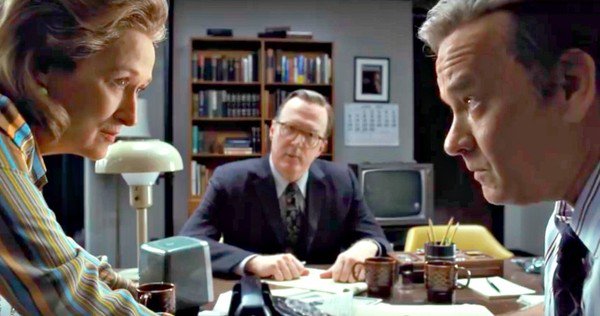The Post
Directed by Steven Spielberg
Starring Meryl Streep, Tom Hanks, Bruce Greenwood, Sarah Paulson, Matthew Rhys, Tracy Letts, and Michael Stuhlbarg
Reviewed by Michael Dalton
[rating: 2/5]
Steven Spielberg’s new film The Post opens in the Vietnamese battleground of 1966 where we meet Daniel Ellsberg (Matthew Rhys), the now notorious whistleblower who stole and distributed The Pentagon Papers. The remainder of the film revolves around The Washington Post’s newsroom. Spielberg, hardly a director noted for irony, marks this arena as a jungle too. The problem with them both is that they’re nowhere near as dangerous as they should be. The screenplay by Josh Singer and Liz Hannah tells of a tumultuous moment in American news reporting when freedom of the press was under fire from Richard Nixon. On the way home from Vietnam, Ellsberg is questioned by Defense Secretary Robert McNamara (Bruce Greenwood) regarding the gravity of the current war. His answer is a neutral one and when McNamara descends from the plane and faces the press he assures them “We’re making progress”. It’s an untruth of course and it demonstrates in basic terms the difference between political truth and public assurance. Shortly after, Ellsberg steals a huge collection of sensitive documents (labeled in large letters Top Secret), many of which find their way to The Times, which printed some but soon after was hit with a lawsuit from high above threatening hell if any more were published. Meanwhile Ben Bradlee (Tom Hanks), the editor of The Washington Post, smelling blood in the ink, quickly dispatches an errand boy to New York to investigate. The Times breaks the news and it looks to be the end of it but soon after, another sheaf of papers from the same heist end up in Bradlee’s lap and so he and the recently widowed Katharine Graham (Meryl Streep), the paper’s owner, step into the fray.
For those familiar with this liberating moment in American publishing history I need say no more and for those not, I’ll leave you to make of The Post, a drama weakly masquerading as a thriller, what you will. Only the day before, I watched Alan Pakula’s award-winning 1976 drama All The President’s Men that told of Watergate, Deep Throat, and the reporters Bernstein and Woodward who broke the story. Like that film, Spielberg’s treatise has its moments, not least every scene Hanks and Streep get to play together and they play very well thank you. What The Post distinctly lacks, for all its thoughtful production design (it is a handsome film), is cumulative tension. We dash here, we dash there, listen to incendiary issues argued, peer through a White House window as Nixon debates the state of play (he’s projected here as a sleazy little ghoul), watch Mr. Bradlee grimace, and observe Mrs. Graham take on rooms full of mildly disgruntled men and host parties (in one scene she floats about in a ridiculous gold kaftan that distracts from a tense scene).
The hook of the film, so timely now (which, a rare thing for a Spielberg film, suggests a short shelf life), is of course freedom of the press and censorship but Spielberg all but forgets about his whistleblower. With affairs of state in America in such frightening disarray, this story is like a scud missile aimed perfectly at the current administration whose chief happily dismisses his foes with a twitter. Spielberg makes his point clear but for a keener portrait, the key player should’ve been the lead player. As it stands, Ellsberg is moved to the shadows once his actions hit their mark. Clearly more interested in the grandstanding of his leading luminaries, Spielberg fails his own film.




